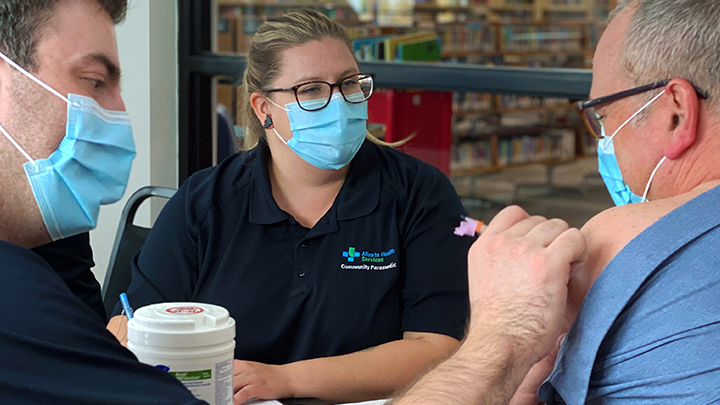
December 6, 2021

Ken Feser, chief librarian at Medicine Hat Public Library, receives his third dose of COVID-19 vaccine from community paramedics Landen Mauch and Kaitlynn Dick. Photo supplied.
Story by Kelly Morris
The mobility of community paramedics has boosted access to COVID-19 immunizations by bringing the service to where it’s needed most among vulnerable populations.
More outreach clinics are the result of Alberta Health Services (AHS) working alongside community partners to reach the vulnerable where they gather — the Salvation Army, Mustard Seed, Alpha House, public libraries and more.
“The goal we had from the start is to increase the number of people getting immunized, recognizing that there are barriers for many people to get to our public health sites,” says Cathy Woolfrey, manager of AHS’ Population Health Promotion Program.
“We offered a number of outreach clinics earlier this year with our public health immunizers, but as the demand grew we weren’t able to use our public health team for additional clinics so we had to consider other resources.”
Connecting with Michele Smith, a manager with Mobile Integrated Healthcare, Woolfrey asked if the community paramedics would be interested in receiving training to administer COVID-19 vaccinations, thus increasing access to the populations they already care for on a regular basis.
“Community paramedics aim to treat patients in place by collaborating with care teams to improve access to care, by being mobile and bringing care to patients who need it most, where they need it most, and making referrals for additional care as needed,” says Smith.
“Community paramedics come equipped with the tools to perform comprehensive assessments and to provide treatments or interventions, almost like an urgent care on wheels.”
Their mobility has proven its value throughout the pandemic, as they assist with rapid testing on location and now bring immunizations to people who face barriers to access. Partnering with community organizations that routinely draw a crowd means being available when and wherever people show interest in learning more about immunization.
These partnerships “leverage what we have to offer patient-centred care — and go to where people are, and doesn’t expect them to be able to get to us all the time,” adds Woolfrey. “At the Salvation Army, they serve a bag lunch or a hot supper, while the Mustard Seed serves a breakfast, so we try to be there around that time when people will be there, and be available, if they’re interested.”
Smith adds: “They can comfortably come and have their breakfast or pick up a bagged lunch — but also potentially get the vaccine. These are environments that our team is very comfortable working in, and we have the mobility to be able to do it.”
A recent outreach event, held at the Medicine Hat Public Library, was hosted by chief librarian Ken Feser. The opportunity to get vaccinated was so popular that Mobile Integrated Healthcare had to send in twice as many staff to accommodate community interest.
“I was pleasantly surprised at how popular it was,” says Feser. “I’m really happy we could be part of getting these vaccinations out into the community and starting to fix this challenge. Our standard business model is bringing people together — and we can’t really do that anymore, so any opportunity we have to participate and be involved in the community meets our mandate and our values.”
The library attracts a community of people, regulars that were seen coming out to participate in the clinic.
“There were a lot of people we know, library users, so this was convenient for them,” Feser says of the clinic’s success. “Maybe they enjoyed an opportunity to come down to the library and have something happening. Maybe it’s a chance not just to get the vaccination but to say hi to a neighbour… people are hungry for community, they want to make connections.”
Feser, himself, took advantage of the opportunity to roll up his sleeve and get a booster dose.
“Thanks for the third shot. I feel safer!”